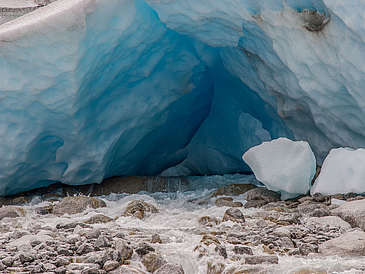The glacier melt in many mountainous regions of the world is already pre-programmed and cannot be stopped. That is the distressing finding of a long-term study conducted by scientists of the universities of Bremen and Innsbruck. Ben Marzeion, Professor of Physical Geography – Climate Science at the Institute of Geography of the University of Bremen, heads the research team. He publicised a summary at a press conference in Vienna. This press conference forms part of the agenda of the annual General Assembly of the European Geosciences Union, which regularly attracts more than 10,000 participants.
The Most Dramatic Sign of Global Warming
Melting glaciers are one of the most dramatic signs of global warming. They clearly show the magnitude of changes in the world’s climate. In addition to the melting ice sheets in Greenland and Antarctica and the expansion of sea water due to rising temperatures, melting glaciers are the main cause for sea level rise.
But even though retreating glaciers have already altered distinctly the landscape of many mountains in the world, the underlying change is even greater because glaciers react to climate change with a time delay: just as with a block of ice you take out of the refrigerator, the environment of the glaciers warms up and the ice melts. The larger the block of ice, the longer it takes until it has melted – and glaciers are, of course, extremely large blocks of ice. It can take many decades or even centuries before they have adjusted to higher temperatures by retreating to the higher reaches of mountains. Large parts of the ice we marvel at in the mountains are no longer living glaciers but are merely waiting to melt. Therefore, the glacier melt of the coming decades is only partially contingent on the impending temperature rise – the critical role is instead played by the rising temperatures of the past decades.
Marzeion: ‘60 Percent of Glaciers Will Disappear’
‘Because glaciers react with a time delay, our current behaviour – and that primarily means the amount of carbon dioxide we emit – only has a limited influence on glaciers,’ Professor Ben Marzeion explains. ‘Even if climate warming were to stop today – which is physically impossible – about one third of the glacial ice in the world would still melt in the long term.’
In view of the glacier melt, even the ambitious aims of the climate agreement adopted in Paris in December seem disillusioning. The agreement aims to limit global warming to 2 degrees. This would mean that about 60 percent of the world’s glaciers are going to disappear in the centuries to come. Even if the aim were a yet harder-to-reach global warming of only 1.5 degrees, it would still result in about 50 percent of glaciers melting.
‘Saving the glaciers is an illusion in many mountain ranges,’ says Marzeion. ‘We will have to adapt to the consequences of glacier melt. This will affect the coastal regions of the world, but also populations in the mountainous regions, who will have one fewer source of water at their disposal in summer.’
For further information:
University of Bremen
Faculty of Social Sciences
Institute of Geography
Ben Marzeion
Professor of Climate Science
Phone: +49 (0)421 218 67170
Mobile: +49 (0)177 761 1873
Email: ben.marzeion@uni-bremen.de
www.marzeion.info

